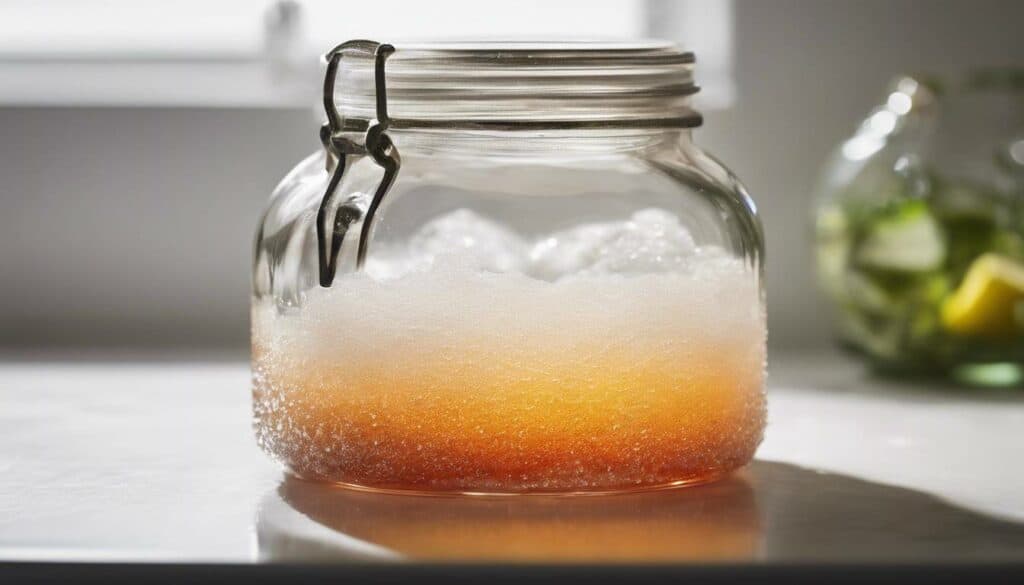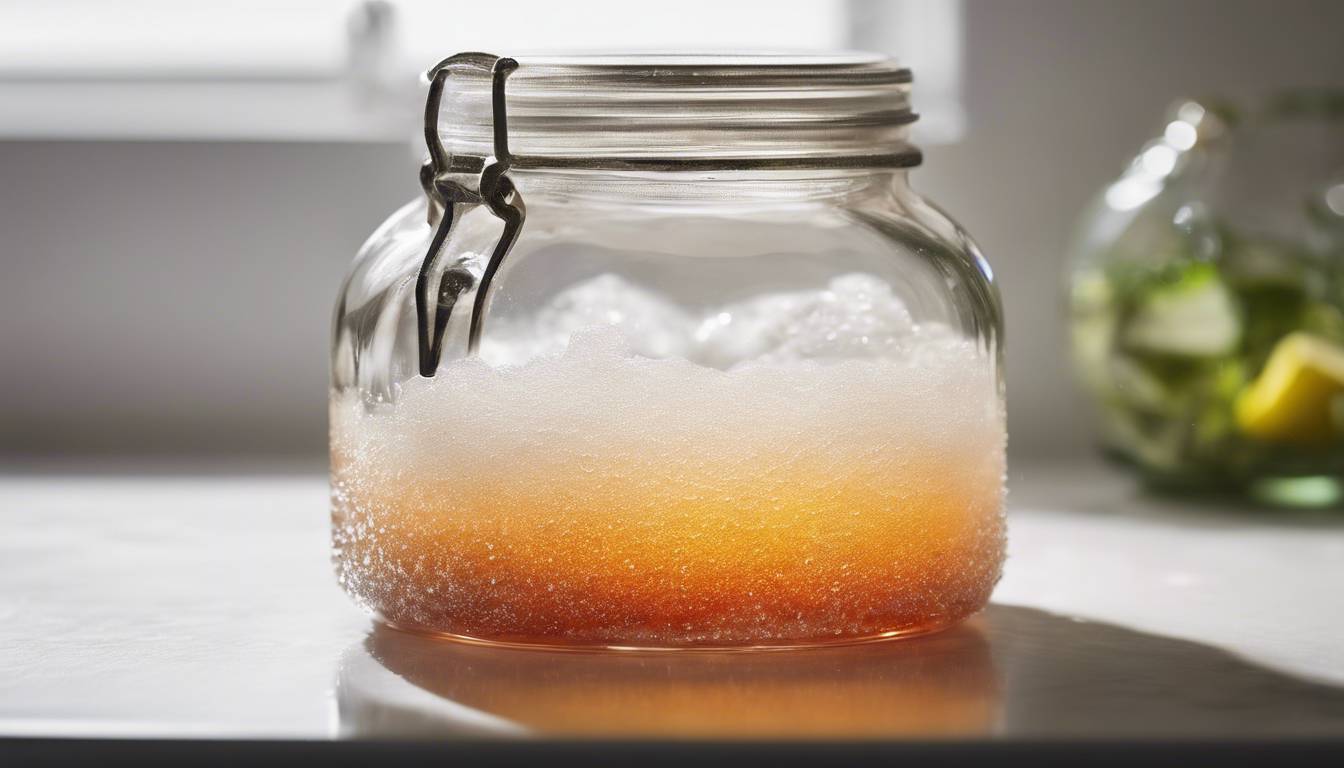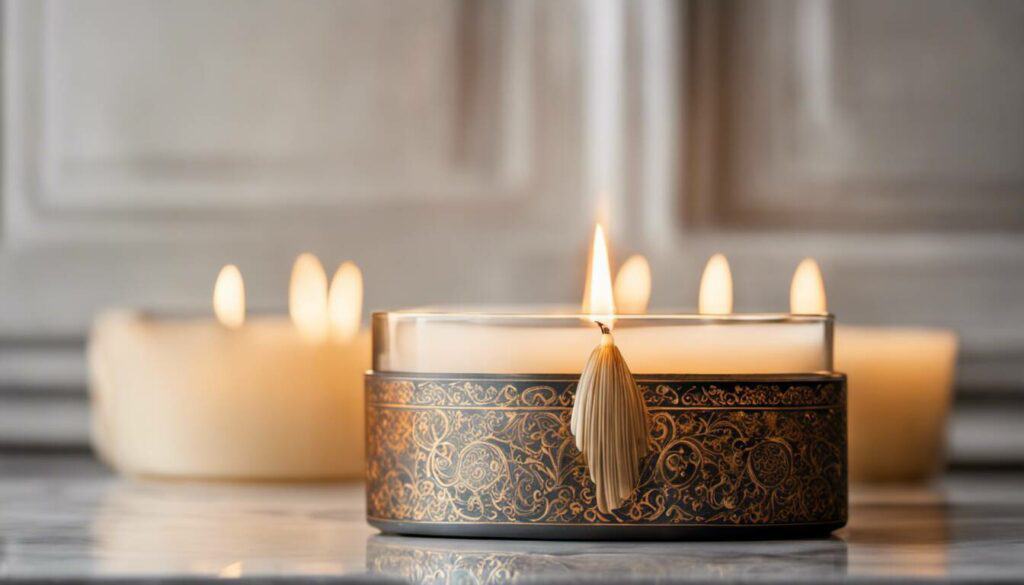I’m excited to share my go-to cleaning hacks with you, featuring just two simple ingredients: baking soda and vinegar. While these two ingredients are commonly used for cleaning by households, I’m eager to show how they’ve become my secret weapons for tackling specific cleaning challenges in my home.
Baking soda mixed with vinegar makes a powerful, all-natural household cleaner. This combination is not only efficient but also cost-effective and beneficial for our environment. Surprisingly, these common kitchen ingredients don’t just whisk away dirt; they can deal with tough stains and odors too, often outperforming synthetic cleaners. Now, let’s explore their everyday uses.
Baking soda and vinegar can be combined to create a natural cleaning solution that is effective for removing stains, deodorizing surfaces, and unclogging drains. When mixed, they produce carbon dioxide, which can help lift dirt and grime. However, it’s important to note that while this combination has some cleaning properties, it may not be as effective as commercial cleaning products for certain tasks such as removing tough grease. Always test on a small area before widespread use.
The Power of Baking Soda and Vinegar: Natural Cleaning Solutions for Your Home
Baking soda and vinegar are like a dynamic duo, but instead of fighting crime, they’re fighting grime! But have you ever wondered why these two ingredients are so powerful when it comes to cleaning? Well, it all comes down to their unique chemistry. When baking soda (sodium bicarbonate) is combined with vinegar (dilute acetic acid), an interesting chemical reaction takes place. The two substances mix and react, producing carbon dioxide gas, water, and sodium acetate. This simple experiment exemplifies the versatility and effectiveness of these two natural cleaning agents when used separately or together.
The Cleaning Powers of Baking Soda and
Vinegar is acidic, with a pH level of 2.4, making it effective at cutting through grime and breaking up mineral deposits. In fact, it’s so versatile that it can even be used as a natural weed killer in your garden. When combined, they create a fizzing reaction that helps to loosen stubborn stains, making them easier to wipe away. This natural cleaning solution is particularly effective for hardwood floors, where harsh chemicals might cause damage.
Eco-Friendly and Cost-Effective Cleaning
But the power doesn’t stop there! These natural cleaning agents are eco-friendly and cost-effective. They are readily available in most households, making them an attractive alternative to commercial cleaning products that often contain harsh chemicals. Plus, they are gentle on sensitive surfaces like stainless steel, marble, and tiles, making them ideal for everyday cleaning.
It’s important to note that while baking soda and vinegar offer numerous benefits in home cleaning and maintenance, there are important safety considerations to keep in mind when using them. For example, while the reaction between the two substances is relatively safe, it’s still necessary to take precautions to avoid splashes in the eyes and use protective clothing during cleaning.
The versatility and eco-friendliness of baking soda and vinegar make them indispensable tools for maintaining a clean and fresh home without relying on harsh chemicals.
Now that we’ve explored the science behind their cleaning power and their eco-friendly nature, let’s dive into their practical applications in various aspects of home cleaning and maintenance.
Everyday Cleaning Uses for Baking Soda and Vinegar
When mixed with water, vinegar effectively removes tough residue from microwaves and dishwashers without harming internal components—an invaluable tip for a consistent approach to appliance maintenance. For those interested in natural kitchen cleaners, vinegar is a top choice.
In summary, incorporating everyday uses for baking soda and vinegar into your cleaning routine not only ensures effective results but also promotes sustainability through natural cleaning solutions that protect both your home environment and your health.
Now that we’ve witnessed the remarkable prowess of baking soda and vinegar in everyday cleaning tasks, let’s shift our focus to exploring how these humble ingredients unleash powerful chemical reactions for home cleaning.
Unleashing Chemical Reactions for Home Cleaning
When you mix baking soda (sodium bicarbonate) with vinegar (dilute acetic acid), it sparks a chemical reaction beyond just a fizzing soda volcano from your school science fair. This reaction produces carbon dioxide gas, water, and sodium acetate. It’s like a mini experiment happening right in your kitchen or bathroom!
This chemical reaction is actually something you can use to your advantage when cleaning your home. For example, when mixed together, baking soda and vinegar form a bubbling mixture that can be great for clearing clogged drains and removing mineral deposits.
This foaming action helps dislodge gunk and debris stuck in the pipes, making drain cleaning less of a hassle. The bubbling action helps to break down tough blockages, allowing water to flow freely once again. It’s an effective alternative to harsh chemical drain cleaners and safer for your pipes and the environment.
In addressing minor drain clogs, severe blockages may require professional assistance.
Imagine you’ve noticed that the water in your bathroom sink isn’t draining properly. Instead of reaching for a commercial drain cleaner with strong chemicals, you could simply pour some baking soda down the drain followed by vinegar. The fizzy reaction will help dislodge the debris causing the blockage.
This chemical reaction can also be utilized to remove mineral deposits in appliances such as coffee makers and kettles. Mixing equal parts water and vinegar and then running the solution through your appliance can help eliminate mineral buildup, keeping your appliances functioning at their best.
Cleaning Purpose |
Baking Soda and Vinegar Solution |
|---|---|
Clearing Clogged Drains |
Forms bubbly mixture to dislodge debris |
Removing Mineral Deposits |
Breaks down mineral buildup in appliances |
With this newfound understanding of the powerful chemical reaction between baking soda and vinegar, you can confidently utilize this natural cleaning method to tackle various household maintenance needs.
Armed with these natural cleaning hacks, it’s time to elevate our cleaning game further with advanced tips on enhancing the cleaning power of baking soda and vinegar.
Enhancing Cleaning Power with Baking Soda and Vinegar
If you thought baking soda and vinegar were impressive on their own, wait till you see what they can do when they team up! When combined, these two everyday items create a powerful effervescent action that is capable of dislodging stubborn dirt, grease, and grime from a variety of surfaces, making them much easier to clean. This bubbly reaction isn’t just for show – it can help to lift and break down tough stains and build-up, making your cleaning efforts more efficient and effective. This dynamic duo could be your new best friend if you’ve ever battled with tough stains or hard-to-remove grime.
One way to harness the enhanced cleaning power of baking soda and vinegar is by creating a paste with them. The paste can be applied to particularly stubborn stains or areas of tough grime. The chemical reaction between the two substances generates a fizzy foam that helps to dislodge dirt and grease from surfaces, making it easier for you to wipe away the mess. This method is particularly useful for especially grimy areas such as the stovetop or oven where grease tends to accumulate and harden over time.
Combine 2-3 tablespoons of baking soda with enough white vinegar to form a thick paste. Apply the paste directly onto the affected area and let it sit for about 15 minutes to allow the chemical reaction to work its magic. After the fizzing has subsided, scrub the area gently with a sponge or cloth before rinsing it away.
It’s important to note that this method should not be used on delicate surfaces or materials that could be damaged by the abrasive action of scrubbing. Always test a small, inconspicuous area before applying the paste to ensure that it won’t cause any damage. Additionally, be cautious when working with vinegar as its acidic nature can cause harm if not handled properly.
Remember, when using this paste, the goal is to facilitate the loosening and removal of tough dirt and grime rather than aggressively scrubbing an area.
By combining baking soda and vinegar in a simple paste, you can effectively tackle stubborn stains and tough grime without resorting to harsh chemical cleaners. The natural effervescence created by this combination is not only powerful but also environmentally friendly, making it an excellent addition to your cleaning arsenal.
In my journey experimenting with natural cleaning solutions, I’ve uncovered an array of unconventional uses for these household staples. Now, let’s uncover how they come in handy not just for household chores but also personal care solutions.
Personal Care Solutions with Baking Soda and Vinegar
Just as they work wonders when combined for cleaning, baking soda and vinegar team up to offer some pretty nifty personal care alternatives. Many people are surprised to discover that these two household staples aren’t just a dynamic duo for keeping a home clean, but also have fantastic uses in personal care. Let’s explore how these natural alternatives can elevate your self-care routine.
Natural Deodorant with Baking Soda
Have you ever wondered why so many natural deodorants list baking soda as a star ingredient? It’s because baking soda is known for its ability to neutralize odors. Applying a small amount of baking soda to the underarms can help absorb sweat and curb odor-causing bacteria, making it an effective and affordable natural deodorant alternative. Be sure to apply sparingly, as baking soda can be drying for some people.
Hair Rinse with Vinegar
Vinegar might seem like an unlikely candidate for hair care, but it actually has a refreshing role to play. When diluted with water, vinegar can be used as a hair rinse to remove product buildup, restore shine, and help balance the scalp’s pH level. For individuals looking to reduce chemical exposure in their hair care routine, diluted vinegar offers a gentle and natural alternative worth considering.
Soothing Foot Soak with Baking Soda and Vinegar
After a long day on your feet, treat yourself to a soothing foot soak using a mixture of baking soda and vinegar. This combination can help combat foot odor and fungal infections while creating a relaxing at-home spa experience. The gentle fizzing effect from the reaction between baking soda and vinegar can leave your feet feeling refreshed and rejuvenated.
It’s clear that baking soda and vinegar extend their usefulness beyond household cleaning—they offer practical and beneficial solutions for personal care needs, providing a non-toxic alternative for those seeking gentle, natural products for their skin, hair, and overall well-being.
As we depart the realm of personal care solutions utilizing baking soda and vinegar, let’s shift our focus to the essential safety measures necessary when utilizing these versatile household ingredients.
Safety Measures when Using Baking Soda and Vinegar
As amazing as baking soda and vinegar are for cleaning, it’s essential to handle them with care. When these two substances combine, they create a bubbly reaction that can catch anyone’s attention. But it’s important to take certain precautions to ensure your safety and the proper maintenance of surfaces.
Firstly, it’s crucial to ensure proper ventilation when using baking soda and vinegar. The reaction between the two substances produces carbon dioxide gas, so it’s important to have windows or doors open to allow fresh air to circulate in the area. This will help prevent the build-up of carbon dioxide gas in enclosed spaces, ensuring a safe breathing environment. If you’re working in a small or enclosed area, take extra caution by using fans to improve air circulation.
Avoiding direct eye contact with the concentrated solutions is also crucial. Accidental splashes can happen during mixing or application, which is why wearing protective eyewear is advisable. In case of accidental contact with eyes, it is important to immediately rinse them with water for at least 15 minutes and seek medical attention if irritation persists.
Moreover, conducting a patch test before using baking soda and vinegar on sensitive surfaces is highly recommended. Some materials may react adversely to these substances, leading to discoloration or damage. Conducting a patch test involves applying a small amount of the solution on an inconspicuous area of the surface and evaluating any adverse reactions before proceeding with full-scale application.
Lastly, when working with concentrated mixes, protective clothing such as gloves and long sleeves should be worn to minimize skin exposure. It’s also crucial to remember that mixing bleach and vinegar can be dangerous and should always be avoided. Since both baking soda and vinegar are relatively safe products individually, handling them correctly can greatly reduce any risks associated with accidental spills or direct contact.
By ensuring proper ventilation, avoiding direct eye contact, conducting patch tests on sensitive surfaces, and utilizing protective clothing are all essential safety measures when working with baking soda and vinegar for cleaning. By adopting these precautions, you can safely harness the natural cleaning power of these household ingredients while safeguarding yourself and your surroundings.
With these vital safety measures in mind, let’s now move on to debunk some common myths about the cleaning power of baking soda and vinegar.
Debunking Myths on Baking Soda and Vinegar Cleaning Power
While it’s true that baking soda and vinegar are incredibly versatile and effective natural cleaning solutions for various household cleaning tasks, it’s also important to dispel some common misconceptions about their cleaning power. One prevalent myth is the belief that combining baking soda and vinegar creates a potent cleaner capable of tackling any mess. While the combination of these two ingredients does create a fizzy reaction that can be effective for certain tasks, it’s crucial to understand the real benefits and limitations of using them for home cleaning and maintenance.
Let’s shed some light on these myths. One such misconception is the idea that the combination of baking soda and vinegar can act as a powerful disinfectant. While both baking soda and vinegar have some antibacterial properties, their combined use doesn’t necessarily result in an effective disinfectant. Although they can help eliminate certain types of bacteria and odors, they may not be as powerful as commercial disinfectants when it comes to combating strong germs.
Another common myth is that baking soda and vinegar are sufficient for deep cleaning or removing tough stains from surfaces like grout or stubborn grease from kitchen appliances. Although they are effective for light cleaning tasks, extensive scientific studies have shown that these natural ingredients may not be as potent as specialized commercial cleaning agents specifically designed for heavy-duty cleaning. For example, baking soda by itself may not effectively remove all types of grease, and vinegar may not fully eliminate certain stubborn stains.
Consider a scenario where a kitchen countertop has accumulated stubborn grease residue over time. While a mixture of baking soda and vinegar can help lift some of the grease, using a specialized degreaser designed for kitchen surfaces may provide more effective results, especially when dealing with tough, baked-on grime. This demonstrates the importance of understanding the specific capabilities of each cleaning agent for different tasks.
Additionally, while baking soda and vinegar are invaluable for deodorizing and freshening various areas in the home, there are situations where they may not completely eliminate persistent odors or tackle deeply ingrained smells. In these cases, it may be necessary to explore alternative odor-eliminating methods tailored to specific sources of odor.
Understanding the true benefits and limitations of using baking soda and vinegar for home cleaning is essential in order to make informed decisions about their usage, dispel myths, and ensure the most effective cleaning outcomes.
In conclusion, while baking soda and vinegar are versatile cleaners for various household tasks, it’s important to recognize their limitations and use them strategically alongside other products for optimal cleaning results.






